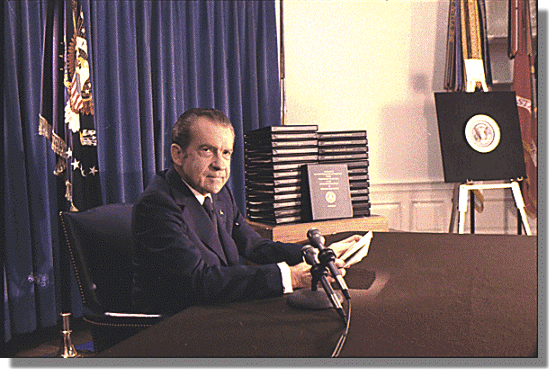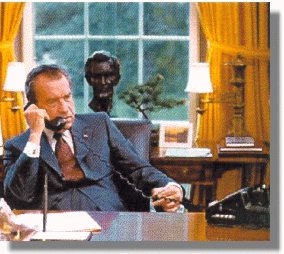Nixon Tapes

President Nixon holding press conference releasing transcripts from his taped conversations. NARA photo.
The Nixon White House Tapes consist of approximately 3700 hours of recordings
containing approximately 2800 hours of recorded conversations between
President Nixon, his staff, and visitors at locations in the Oval Office;
the President's Executive Office Building hideaway office; the Cabinet
Room; various White House telephones in the Oval Office, EOB and the Lincoln
Sitting Room; and at various Camp David locations. These recordings were
produced surreptitiously, without the knowledge of most of the participants.
Following the negotiated Tapes Settlement Agreement of 1996, between the
National Archives, the Nixon Estate, and Public Citizen, the Nixon Presidential
Materials Staff (NLNS) began a review of all the Nixon White House tapes
in chronological segments. For each of these chronological segments entire
conversations, as determined by the tapes reviewers, were reviewed and
opened in full context. To date the Nixon Presidential Materials Staff
has reviewed and opened approximately one thousand four hundred and forty-four
(1444) hours of the complete conversations from the Nixon White House
tapes for public access.
| Nixon White House Tapes - | ||||||||
| We are presenting here audio excerpts from some of those conversations in the Nixon White House Tapes which touch on subjects related to Social Security, Medicare and related subjects. | ||||||||
|
|
||||||||
| Tape No. |
Conversation No. |
Date |
Time |
Length |
||||
| 1 | RC 361 | Oval 468-15 | 3/16/71 | 2:23 p.m. | 1:38 | |||
| Participants: The President and Treasury Secretary John Connally | ||||||||
| In this conversation the President and Secretary Connally are complaining about Federal Reserve Chairman Arthur Burns' tendency to comment on areas of policy, such as Social Security, that are outside what they consider his appropriate authority. In passing, the President mentions that Burns has even opined that he believes Social Security should be on a pay-as-you-go basis. This is fundamental financing issue for Social Security and clearly the President and Connally think it is not Burns' place to comment on such matters. This conversation is noteworthy because the President clearly states his view that pay-as-you-go is the proper financing basis for Social Security. | ||||||||
| 2 | RC 505 | Oval 483-16 | 4/20/71 | 3:06 p.m. | 10:58 | |||
| Participants: President and George P. Shultz | ||||||||
| During this discussion Office of Management & Budget Director, George Schultz, briefs the President on the potential impacts of a change in the Social Security wage-base. The Congress is considering the Administration's bill, H.R.1, and in doing so is contemplating making additional changes to the wage-base, beyond those recently enacted. Schultz explains to the President how the wage-base and tax revenues interact and they then go on to explore the potential impact of the changes being considered on the unified budget for the government. | ||||||||
| 3 | RC 541 | Oval 489-17a
Oval 489-17b |
4/26/71 | 3:17 p.m. | (a) 5:48 (b) 5:56 |
|||
| Participants: The President, John D. Ehrlichman and George P. Shultz | ||||||||
| During this discussion George Schultz briefs the President
on his recent conversations with Ways & Means Chairman Wilbur
Mills (D-AR) and Ranking Member John Byrnes (R-WI) concerning H.R.
1. The Administration is trying to find a strategy to gain support
for H.R. 1 and is considering adding revenue sharing provisions as
a way to get Mills' support. In the second part of this conversation, Shultz and the President continue exploring the same line, diverting a time or two to discuss other matters then returning the issue of the politics of welfare reform. |
||||||||
| 4 | RC 624 | Oval 500-16 | 5/18/71 | 11:30 a.m. | 1:31 | |||
| Participants: The President met with John D. Ehrlichman and George P. Shultz. | ||||||||
| In this brief exchange, the President discusses with Ehrlichman and Schultz recent Congressional actions regarding Social Security COLAs. Ehrlichman and the President tout the positive political payoffs with the elderly and Shultz mentions the potential budget impact. | ||||||||
| 5 | RC 627 | Oval 500-26 | 5/18/71 | 3:42 p.m. | 2:08 | |||
| Participants: The President met with H.R. ("Bob") Haldeman and Charles W. Colson. | ||||||||
| In this conversation, the President and his aids are reviewing potential issues for the 1972 election campaign. The conversation briefly touches on Social Security and the Administration's Family Assistance Plan (FAP. There are strong expressions of the President's views on welfare reform. This conversation is notable because it suggests that President Nixon may not have been a strong supporter of the FAP that his Administration had been developing. The President makes clear that welfare reform is a much higher priority for him than the FAP. | ||||||||
| 6 | RC 1350 | WHT 14-84 | 11/12/71 | 2:36 p.m. | 1:53 | |||
| Participants: President, John D. Ehrlichman | ||||||||
| In this conversation the President informs John Ehrlichman that he does not support the proposal from Secretary of Health, Education and Welfare Elliot Richardson regarding child care policies. | ||||||||
| 7 | RC 1350 | WHT 14-85 | 11/12/71 | unk. | 3:41 | |||
| Participants: John D. Ehrlichman and John N. Mitchell | ||||||||
| The Attorney General is calling Ehrlichman to report that California Governor Ronald Reagan is complaining about a speech by HEW Undersecretary John Veneman in which Veneman discussed the Administration's policies on welfare reform. Ehrlichman assures Mitchell that this is just political maneuvering between Reagan and HEW Secretary Elliot Richardson over California's participation in a HEW demonstration project and not an expression of some deeper Administration policy. | ||||||||
| 8 | RC 177 | CA 105-9 | 9/29/72 | 9:19a.m. | 12:22 | |||
| Participants: President, George P. Shultz met with Donald H. Rumsfeld, Earl L. Butz, Peter G. Peterson, James D. Hodgson, George W. Romney, Caspar W. ("Cap") Weinberger, General George A. Lincoln, Herbert Stein, Virginia H. Knauer, Arthur F. Burns, John G. Veneman, Robert M. Ball, Johnnie M. Walters, Arthur S. Flemming, Thomas B. Curtis, Edward Preston, Marina von N. Whitman, James W. McLane, William Geimer, Richard B. Cheney, Bert M. Concklin, William Walker, Marvin H. Kosters, Donald R. Murdoch, William I. Greener, Jr., and C. Robert Lane; the White House photographer and members of the press were present at the beginning of the meeting | ||||||||
| As part of the Nixon Administration price controls, there was an effort to control rents, through the Administration's Rent Control Program. In this Cabinet meeting there is a conversation about the ability of Social Security recipients to afford high rents. There is also mention of the role of the Social Security Administration in helping publicize the Administration's Rent Control Program. SSA Commissioner Robert M. Ball was in attendance at this Cabinet meeting. | ||||||||
| 9 | RC 178 | CA 105-10
CA 105-10a |
10/2/72 | 8:05 a.m. | (10) 15:16 (10a) 6:46 |
|||
| Participants: President, Leslie C. Arends met with John B. Anderson, Samuel L. Devine, William J. ("Jack") Edwards, H. Allen Smith, John J. Rhodes, Barber B. Conable, Jr., Frank T. Bow, John W. Byrnes, Charls E. Walker, Caspar W. ("Cap") Weinberger, John D. Ehrlichman, William E. Timmons, Ronald L. Ziegler, James E. Smith, Richard K. Cook, Kenneth R. Cole, Jr., and William L. Gifford | ||||||||
| During this Cabinet meeting the discussion focuses on the pending Congressional action to raise the government spending ceiling. The excerpt opens with OMB Deputy Director Caspar Weinberger talking about the potential impacts of the budget ceiling legislation on Social Security and on H.R. 1, which was the Administration's major welfare reform bill. The conversation ranges widely over the budget and the debt ceiling and related subjects. | ||||||||
